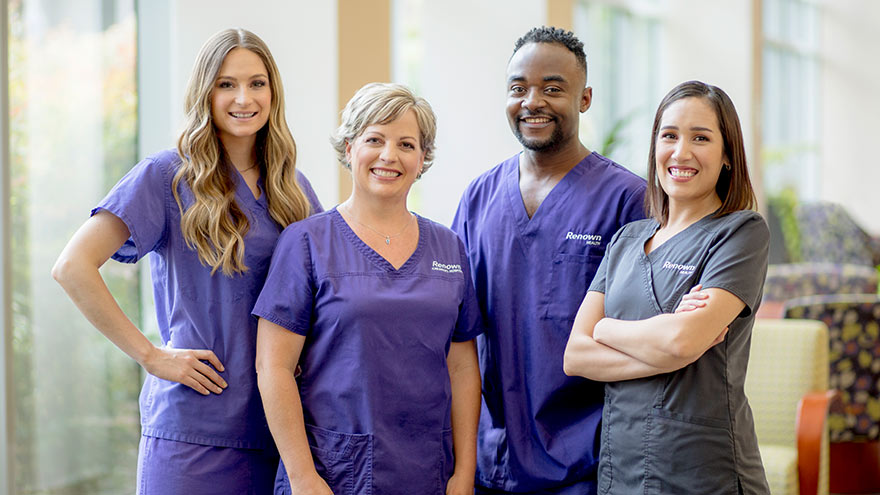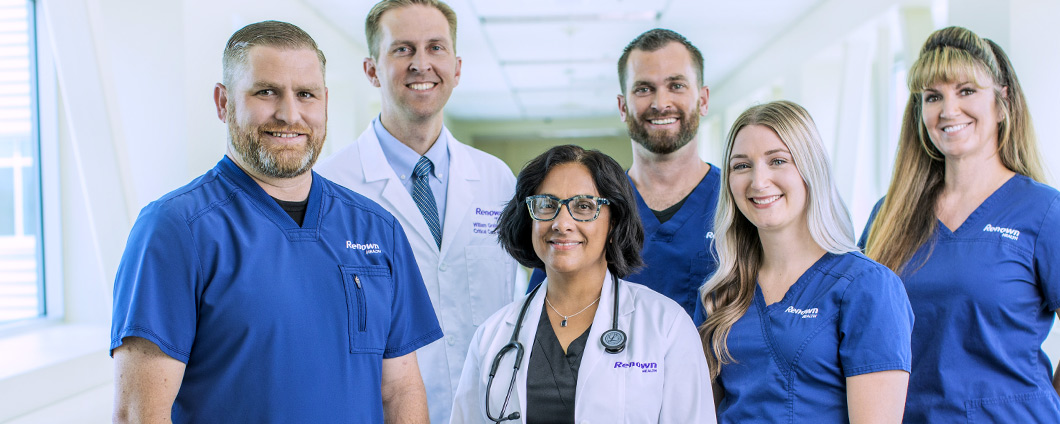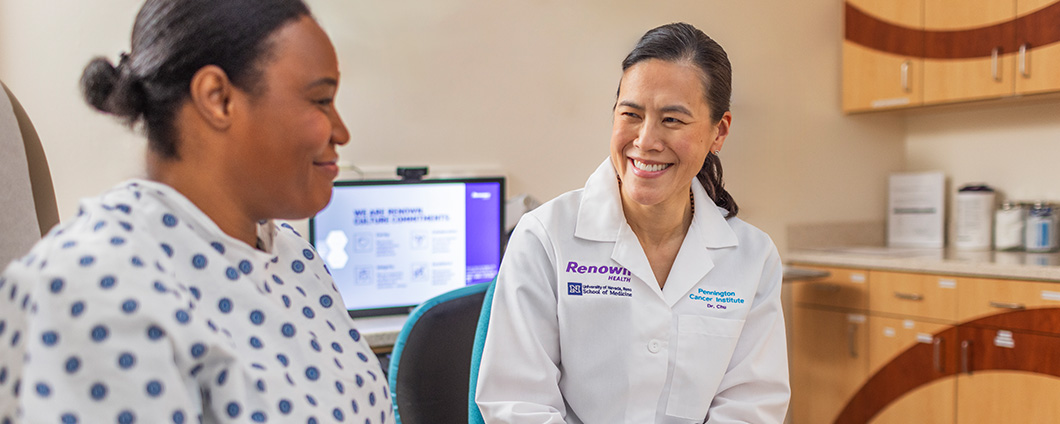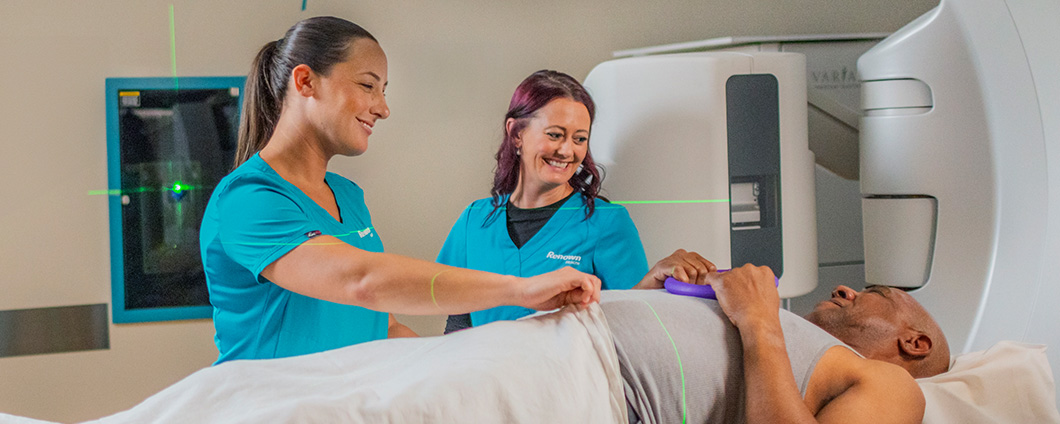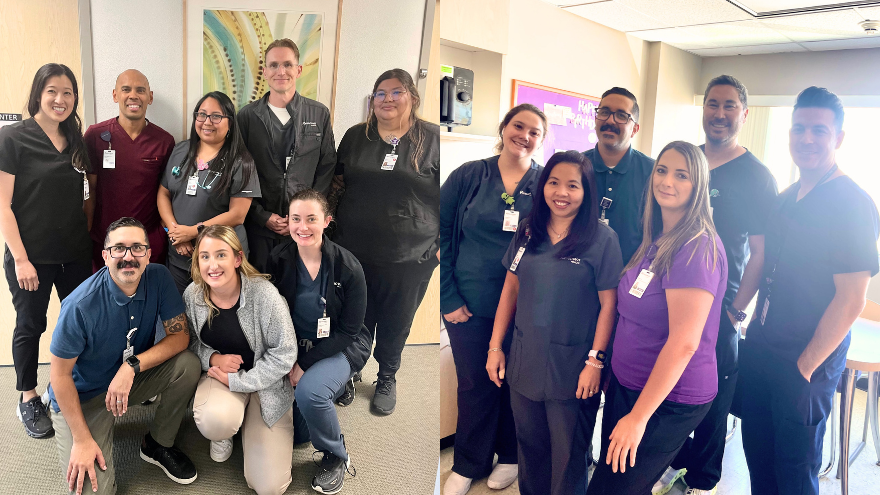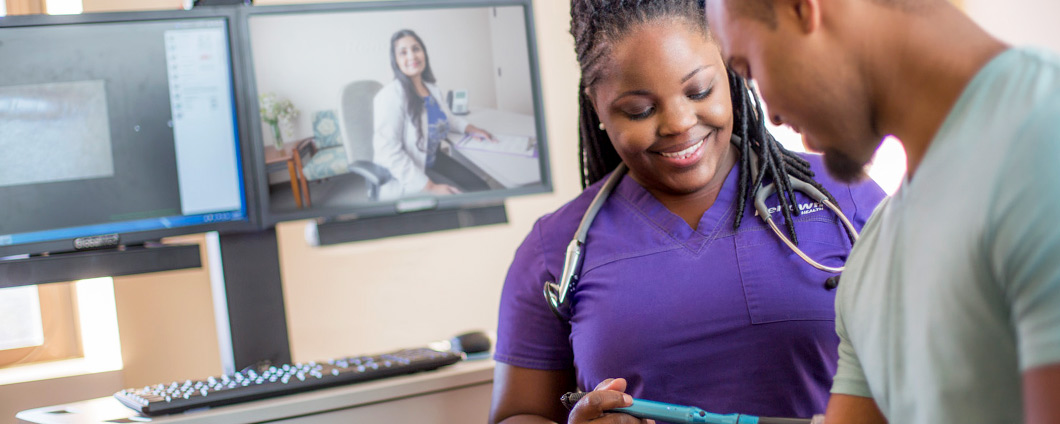Search
Results for 'clinic'
Clear-
Planning Your Care
Planning Your Care at Renown Your care is a team effort, combining the skill and expertise of doctors, nurses, and other support staff who specialize in cancer diagnosis and treatment. This collaboration happens on multiple levels so that you receive the best possible care and treatment specific to your needs. Multidisciplinary Care “Multidisciplinary” refers to the collaboration between providers from different backgrounds or disciplines and can include doctors, advanced practice nurses, registered nurses, therapists, dietitians and social workers. These teams meet regularly to discuss patient care so that each patient benefits from the professional opinion of a wide range of experts. Multispecialty Treatment Depending on your diagnosis, several different specialists may be involved in your treatment. Pathologists study tissue samples in the lab to confirm the diagnosis. Radiologists diagnose and track cancer with various imaging techniques. Medical oncologists treat cancer with chemotherapy and other medications. Radiation oncologists treat cancer with radiation therapy. Surgical oncologists treat cancer through surgery. Medical Geneticists diagnose cancer through genetic counseling. Gynecologic Oncologists treat cancers of the female reproductive system. These specialists meet to discuss your care plan and coordinate to make sure you’re receiving proven evidence-based care. Center of Excellence A Center of Excellence is recognized for having a multidisciplinary, multispecialty team that provides leadership in research, training and best practices. Renown has three Centers of Excellence that focus on site-specific cancers. These include: Breast Cancer Gastrointestinal Cancer (colon, rectum, liver, pancreas, and stomach) Thoracic Cancer (lung and esophagus) These teams regularly meet to develop and update clinical guidelines, identify quality initiatives, evaluate clinical trials, and assess new technology and processes. Cancer Conferences (Tumor Boards) Multidisciplinary, multispecialty cancer conferences (also called tumor boards) allow cancer specialists, genetic specialists, nurse navigators, nurses, social workers, dietitians, physical therapy specialists, and other providers the opportunity to review new and open cancer cases together and provide expertise from several different viewpoints. This collaboration allows them to develop a comprehensive treatment plan for each patient early in diagnosis or changes to a patient’s clinical status. Who is my point of contact? Having multiple doctors who are working with even more doctors can become confusing for patients. Your Nurse Navigator will guide you through your care, provide you with the resources you need and answer your questions. Nurse Navigators
-
Navigating Renowns Cancer Care Resources Your Essential Guide
Cancer is challenging, but no one has to go through it alone. Patients and their loved ones can navigate the journey towards healing and recovery with the proper support and resources from Renown Health. When faced with a cancer diagnosis, access to reliable and comprehensive cancer resources is key. These resources provide vital information, support, and guidance for patients, caregivers and loved ones throughout cancer treatment and recovery. Cancer Resources Breast Cancer Newly Diagnosed Orientation Class Cancer Support Groups Caregiver Support General Cancer Support Group Lymphedema & Physical Therapy Men’s Prostate Cancer Support Group Newly Diagnosed Breast Cancer Workshop Smoking Cessation Spiritual Center Activities & Programs Sterling Silver 55+ Club Facebook Group At Renown and in collaboration with community partnerships, we offer a variety of resources and specialty care programs focused on improving the quality of life after cancer including: Cancer support groups play a crucial role in providing emotional, psychological, and practical assistance to those affected by cancer These groups often consist of individuals who have been through similar experiences and can offer guidance, empathy, and understanding. They provide a safe space for individuals to share their feelings, concerns, and experiences with others who truly understand what they are going through.
Read More About Navigating Renowns Cancer Care Resources Your Essential Guide
-
What's Special About Nursing at Renown Health
At Renown Health, we live by a core set of values. We are caring and compassionate. We demonstrate respect and integrity. We build relationships and collaborate with patients, families, clinicians and communities. We strive for excellence in all we do. Those values extend beyond patient care to the way we support our employees. We have worked hard to create an environment that empowers each person to learn, grow and thrive. Here are just a few examples of the ways we do that: Establishing a mentorship and leadership development program that provides insight, expertise and learning opportunities. Forming employee committees that improve health and well-being both at work and in our community that complement Renown’s work-life balance programs. Recognizing and rewarding team members for living our values. Providing paid time each quarter to support employee volunteerism and giving back to our community. Offering a variety of education programs, including tuition reimbursement, student loan repayment and a professional advancement bonus program, to help employees achieve their higher education goals. Hosting the largest Graduate Nurse Residency program in the state, which is also one of the largest in the nation. We strive to inspire, educate and help nurses shine, and in return, we know they will make a positive impact on the lives of their coworkers and the people we serve.
Read More About What's Special About Nursing at Renown Health
-
Lung Cancer Screening and Early Detection
Lung cancer is the leading cause of cancer deaths in both men and women in the U.S. The good news is the five-year survival rate increases dramatically if lung cancer is treated before spreading to other parts of the body. Julie Locken, MD, of Renown Health Imaging, explains more. What are the signs and symptoms of lung cancer? As you might expect, most lung cancer symptoms appear in the chest and can affect your breathing. Watch for signs such as: Persistent cough Constant chest pain Shortness of breath Wheezing Bloody or rust-colored phlegm Hoarseness Swelling of the neck Pain or weakness in the shoulder, arm or hand Recurring pneumonia, bronchitis or other lung infections Loss of appetite and loss of weight can also be signs of lung cancer That said, there are usually no symptoms in the early stages of lung cancer, which means getting screened can truly be a lifesaver. If you have a history of smoking, you should get screened as a precaution. What are the risk factors of lung cancer? Around 80% of lung cancer cases stem from a history of smoking tobacco. But there are other known causes, such as secondhand smoke, radon, asbestos and diesel exhaust. It’s important to do what you can to eliminate exposure to all of these to reduce your lung cancer risk. People with an immediate relative – a parent, sibling or child – diagnosed with lung cancer and people between 50 and 80 years old are also at higher risk and may need to consider screening. People who are at the highest risk are those with a history of smoking tobacco, particularly smokers who averaged one pack of cigarettes per day for 20 years or more, as well as former heavy smokers who quit in the last 15 years.
-
From Renown NICU Nurse to NICU Mom: Mariah DaSilva’s Inspiring Journey
Located on the 5th floor of the Tahoe Tower, Renown’s newly updated Level III Neonatal Intensive Care Unit (NICU) is decorated with colorful artwork on the walls, the lights dim for the newborns resting, and parents conversing next to the bassinet with nurses on their baby’s journey to health. In the quiet, shuffling hallways stands Mariah DaSilva, a Renown NICU Nurse, whose own birth story showed her true compassion and professional dedication to what it means to care for the tiniest and most vulnerable patients. From the Medical Floor to the NICU Mariah started her nursing career on the medical floor at Renown; however, after a year, she was excited to see her dream job open in the NICU and helping to provide compassionate care for the most fragile patients. “I’ve always known that I wanted to work with babies so being a NICU nurse was a dream of mine,” said Mariah. “I truly love what I do, and I can’t imagine being anywhere else than the NICU.” A high-stakes environment, the NICU is where babies are transferred to after birth when they require medical intervention. They care for babies as young as 23 weeks gestation, up to full-term babies. Any babies born less than 35 weeks are automatically admitted into the NICU for treatment. Other than prematurity, babies can be admitted to the NICU for respiratory distress, low blood sugar (hypoglycemia), cardiac anomalies, birth defects, seizures and other medical conditions that need treatment or assessment. A Day in the NICU: The Heart of Care A typical day for Mariah starts with reviewing her assignments and receiving a detailed report from the night shift. Preparing for the day involves scrubbing in and wiping down patient care areas to maintain a clean environment. Once everything is set, she begins a series of scheduled care tasks, which include performing assessments, feeding, changing diapers and facilitating parent involvement in their baby’s care “There are so many exciting ‘firsts’ that happen in the NICU; parents holding their baby for the first time, parents' first time changing their baby’s diaper, bathing their baby for the first time, first time breast-feeding or bottle-feeding, the baby’s first time taking a full bottle, watching a baby breathe on their own without any respiratory support, etc.,” said Mariah. “There are so many big milestones that happen in the NICU that I am so incredibly lucky to be a part of.” The NICU nurses work closely with neonatologists, nurse practitioners, respiratory therapists, speech therapists, physical therapists, occupational therapists and other specialists to deliver comprehensive care. This teamwork and collaboration ensure that each baby receives the best care possible for their health journey. Mariah shared a reflection on her team: “Our NICU team is amazing. Being a part of a team that is so compassionate and collaborative is amazing. We all work closely together to ensure we’re providing the best care possible for every single baby that comes to the NICU. We are all very protective of the babies that we care for in the NICU and truly want the best outcomes for them and their families. Taking care of such a vulnerable population comes with a lot of responsibility and we take pride in what we do each day.” As with all healthcare professionals, NICU nurses require immense strength and compassion to care for the youngest patients in a highly sensitive environment. “More often than not, we have really good days in the NICU, but we also have really hard days that affect every single person in the NICU,” said Mariah. “The loss of a baby, delivering bad news to a parent, an extended NICU stay and a baby withdrawing from drugs are all situations that we unfortunately deal with in the NICU. These situations are all very challenging, but we have to stay strong for the babies and their families.”
Read More About From Renown NICU Nurse to NICU Mom: Mariah DaSilva’s Inspiring Journey
-
Pulmonary and Sleep Medicine
Pulmonary Medicine Our expert pulmonary medicine team diagnoses and cares for patients with lung and breathing challenges. Serious breathing problems and long-term conditions, such as COPD and emphysema, are treated by our extensively trained providers. Our board-certified care team has the experience and clinical judgment to ensure the strongest possible patient outcomes. If you have a chronic lung condition diagnosis, you may also benefit from Renown Pulmonary Rehab. Conditions We Treat Asthma Bronchitis (acute and chronic) Chest infections Chronic obstructive pulmonary disease (COPD) Cystic fibrosis Emphysema Lung cancer Lung transplant Pulmonary fibrosis Pulmonary hypertension Pulmonary tuberculosis (TB) Other chronic lung diseases Pulmonary Services
-
Consultation and Liaison Services
Admitted to our facility? Our dedicated psychiatrists are here to address your mental health concerns with compassionate care. We offer comprehensive psychiatric consultations and ensure a seamless connection with your provider upon discharge to support your ongoing well-being. Renown’s Psychiatric Consultation and Liaison team is at the forefront of integrated medical and psychiatric practice. We provide expert assessment, diagnosis and management of mental and behavioral health disorders. Our teams at Renown Regional and South Meadows include a diverse group of mental health professionals: General Psychiatrists Child and Adolescent Psychiatrists Psychiatric Advanced Practice Registered Nurses (APRNs) Licensed Clinical Social Workers (LCSWs) Registered Nurses We are readily available to provide care.
-
Cancer Types & Diagnosis
At the William N. Pennington Cancer Institute, we provide comprehensive and compassionate care for a wide range of cancer types. Our team of oncologists, nurses, and support staff are dedicated to delivering personalized treatment plans tailored to each patient's unique needs. With expertise in diagnosing and treating various types of cancer, such as breast, lung, colorectal, prostate, ovarian, and pancreatic, we strive to improve outcomes and enhance the quality of life for our patients. By leveraging cutting-edge advancements in cancer research and state-of-the-art technology, we are devoted to making significant strides in the fight against cancer and offering hope to those in need.
-
Radiation Therapy
Renown Health's Institute for Cancer has the most advanced radiation therapy system of its kind and the first program in the region with American College of Radiology (ACR-RO) accreditation. To serve you, our certified team of experts includes highly trained doctors, medical physicists, dosimetrists, radiation therapists, and registered nurses. What is Radiation Therapy? A common form of cancer treatment, radiation therapy uses high-energy particles to eliminate cancerous cells and may be used in conjunction with other treatments, like chemotherapy or surgery. What to Expect Treating cancer with radiation is a process that usually lasts about five to eight weeks. The first two appointments are consultation, simulation, and mapping, which help plan treatment. Short, daily radiation treatment appointments follow these. Why Choose Renown? Renown's state-of-the-art Varian TrueBeam radiation therapy system delivers treatment so precisely; it reaches sub-millimeter levels of accuracy. In addition, unlike other treatment centers in the region, Renown has the technology to deliver radiation from 360 degrees around the patient's body, allowing us to target cancerous cells and save healthy tissue. Consultation The first appointment is called the consultation. A radiation oncologist meets with the patient to discuss treatment options, perform a physical examination and answer questions. Simulation and Mapping Since radiation therapy aims to target cancer while sparing healthy tissue, to maintain body position and stillness is essential. A CT scan is used to pinpoint cancer's exact location in the patient's body during the simulation and mapping appointment. Doctors refer to these scans as they work together to craft a treatment plan. Patients are fitted with immobilization devices that keep the body still during treatment. In addition, brain and head, and neck cancer patients are equipped with a mesh mask to keep the head and neck in position. For cancers elsewhere in the body, patients are fitted with foam molds that form to the body. These personalized molds are kept on hand for use during daily radiation treatments. Additionally, the radiation therapist creates several pinpoint-sized tattoos on the patient's skin to ensure each daily treatment targets the same area. These tattoos are permanent but small enough to go unnoticed by others. Daily Radiation Treatments At each treatment appointment, a radiation therapist helps the patient.
-
Renown Health and Anthem Blue Cross and Blue Shield Partner to Extend Value-Based Care For Anthem’s Medicaid Members in Northern Nevada
Anthem Blue Cross and Blue Shield Medicaid members will now have access to providers in the value-based Western Clinical Alliance, powered by Renown Health. RENO, Nev. (Dec. 20, 2021) – Members of Anthem Blue Cross and Blue Shield Medicaid in Nevada can now receive care from providers in the Western Clinical Alliance, powered by Renown Health. A first of its kind agreement, the partnership between Anthem Blue Cross and Blue Shield Medicaid and Renown Health extends care for Anthem members in northern Nevada. This agreement gives providers and patients in the region better access to care by focusing on health and well-being while reducing the overall cost of care. The Western Clinical Alliance is a value-based clinically integrated network that puts the patient at the center of care and allows collaboration between providers across the community. “The Western Clinical Alliance has been seeking this kind of innovative and forward-thinking partnership for a while, and we are excited to be working with Anthem Blue Cross and Blue Shield,” said Thomas Graf, MD, Chief Clinical and Quality Officer and Western Clinical Alliance chair. “The partnership creates an environment that eliminates many of the traditional barriers associated with providing the right care, in the right place, at the right time. For us, it is all about ensuring Anthem members have the greatest opportunity to live healthy lives; this includes their participation in preventative and wellness care as well as optimization of their chronic diseases” Western Clinical Alliance providers – including those at Renown hospitals, Renown medical groups and other community-based health organizations – have developed a relationship that makes vital data and insights readily available to better understand every patient’s journey through the healthcare system. Providers in the Western Clinical Alliance work together to drive better outcomes by helping patients receive care in the highest-value settings. “Anthem Blue Cross and Blue Shield is excited to partner with Renown Health and the Western Clinical Alliance because we believe effective health coverage begins with a trusted primary care provider who can guide our members through the complexities of the healthcare system, with an emphasis on prevention and wellness leading to better health outcomes,” said Lisa Bogard, President of Anthem Blue Cross and Blue Shield in Nevada. Many people in the northern Nevada community covered by a Medicaid plan like Anthem’s will have an open enrollment window starting Jan. 1, 2022. In addition to an opportunity to foster a relationship with providers from Renown Health and the Western Clinical Alliance, Medicaid members in Nevada can go to www.chooseanthem.com to enroll in a plan that offers a range of added benefits that promote physical fitness, nutritious home-delivered meals, transportation assistance, Boys and Girls Club memberships, essential support services for new and expecting parents and more. About Western Clinical Alliance & Renown Health Western Clinical Alliance® is a Clinically Integrated Network (CIN) which joins together physicians across our community into a single comprehensive care delivery network. The CIN is in collaboration with Renown Health and other care providers that share a common set of goals focused on increasing value by improving outcomes and better managing the total cost of care for patients. Renown Health is the region’s largest not-for-profit integrated healthcare network serving Nevada, Lake Tahoe and northeast California. With a diverse workforce of more than 7,000 employees, Renown has fostered a longstanding culture of excellence, determination and innovation. The organization comprises a trauma center, two acute care hospitals, a children’s hospital, a rehabilitation hospital and a medical group and urgent care network. For more information, visit renown.org.
-
Department Spotlight: Physiatry
Pain is a top reason that Americans seek access to healthcare. In fact, according to the U.S. Pain Foundation, chronic pain affects nearly 50 million people across the country. More than likely, you know someone who has been impacted by chronic or acute pain. Fortunately, there is a talented team of healthcare professionals committed to rehabilitating and enhancing the life of any patient living with pain. At Renown Health, these team members represent the Physiatry department, who are charged with a goal of maximizing physical function, managing pain and nurturing independence. Headquartered at Renown South Meadows Medical Center, patients suffering with a disability, chronic pain and physical impairments can rest assured that they have the most caring and compassionate physiatry experts on their side throughout the entire physical rehabilitation process. What is Physiatry? Physiatry (also known as physical medicine and rehabilitation, or PM&R), is a medical specialty that helps diagnose and treat conditions related to the musculoskeletal and nervous systems. Unlike other medical fields that often use surgery or medication, physiatry emphasizes non-invasive techniques, therapies and interventional procedures to help with pain and improve physical function. Renown’s physiatry team has a holistic approach to care, combining medical expertise with personalized rehabilitation strategies to support long-term health and independence. Physiatry is hyper-focused on diagnosing, managing and treating conditions that affect physical function and quality of life. The Physiatry Philosophy Our Physiatry team’s treatment philosophy centers around a multidisciplinary approach that combines medical care with rehabilitation and healthy lifestyle changes. They offer a variety of programs and services, including: Home Exercise Programs: Customized exercises designed to strengthen muscles, improve flexibility and support recovery. Physical Therapy: Hands-on care from skilled therapists who guide patients through techniques to restore function and reduce pain. Well-Being and Lifestyle Support: Emphasizing overall health and encouraging lifestyle changes that support physical and mental well-being. At Renown, the Physiatry department is full of friendly faces, including: PM&R and pain medicine physicians (also known as physiatrists) Medical assistants Physician scheduling coordinators Patient access representatives Practice site leaders Physiatrists set each patient up for success with education, treatment planning and management. They take advantage of cutting-edge technologies and interventions for pain, such as: Epidural Steroid Injections (ESIs) Facet Joint Injections Radiofrequency Ablation (RFA) Trigger Point Injections Joint Injections (Knee, Shoulder, Hip) Physiatrists are also masters of multidisciplinary care, coordinating with members of a patient’s healthcare team (including physical therapists) to ensure they have the best treatment plan possible. Playing a crucial supportive role, physiatry medical assistants (MAs) assist our physiatrists in caring for patients on both a clinical and administrative level. From helping during procedures to providing education and guidance, these medical professionals are key in ensuring each patient’s visit – and as a result, their rehabilitation journey – is successful. “My normal day in Physiatry is very smooth,” said Rosita Gans, Medical Assistant. “I make sure my schedule is at 100% to prioritize patient needs. It helps that everyone is so respectful and friendly.” Our patient access representatives (PARs) and physician scheduling coordinators are the front faces of physiatry. They serve as a patient’s first line of communication when checking in, making an appointment, handling insurance verifications and several aspects of follow-up – all with a smile on their faces. “My job as a PAR involves checking patients in and out, verifying their insurance and demographic information, scheduling and following up on appointments, referrals to Special Procedures and more,” said Andrea Ruiz, Patient Access Representative. “I am in contact with patients on a daily basis.” “It’s all about making sure every patient is taken care of in a timely manner,” added Kasey Sinfellow, Physician Scheduling Coordinator. At the core of keeping things running, you’ll find Antonio Quintana, Practice Site Leader. Thanks to his expert leadership skills and can-do attitude, his department has been able to reach new heights. A large part of this team’s success lies in their approach to the practice of physiatry. For them, there is no such thing as a “cookie cutter” treatment plan. Dr. Casey Keating, a pain management physician working with the Physiatry team states, “We understand that there is no ‘one size fits all’ when it comes recovery. We come up with a plan of action customized to meet your needs.”
-
TeleCardiology
Heart Care, Close to Home Telecardiology is an alternative to an in-person visit with a heart specialist. It connects you to a Renown cardiologist by using a secure, video-enabled device. It can be used for consultations, examinations and follow-up appointments. Patients are seen from their local rural community clinic, close to work, home and family, minimizing the cost and time of long-distance travel for heart care. Your Telecardiology Visit Before Your Visit You may need to have a heart test or blood draw prior to your visit. In most cases, you can have the test done locally and our heart doctor will have the results when they meet with you via telecardiology. If this is your first visit, your doctor will determine if you need any tests. During Your Visit After check-in, a medical assistant will check your vital signs in a telecardiology room. Videoconferencing equipment will then connect you to a medical assistant to review your health information. Your cardiologist will talk with you remotely. When it is time for a physical examination, the medical assistant in the room with you will follow the doctor's instructions, facilitating the examination. A digital stethoscope will be used so the doctor can hear your heart and lung sounds. After Your Visit Your heart doctor will talk then review their findings and you will be able to ask questions.


